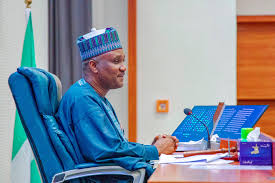The Speaker of the House of Representatives, Tajudeen Abbas, emphasized the pivotal role that teacher training plays in Nigeria’s pursuit of quality education at all levels. Speaking at a public hearing on bills to amend the Federal Colleges of Education and National Teachers Institute Acts,
Abbas underscored the significance of continuous education and professional development for educators. He highlighted that investing in teacher training programs is crucial for shaping responsible citizens and contributing to national development.

Abbas emphasized that educators are not only disseminators of knowledge but also mentors and role models who shape young minds and instill enduring values. By investing in their training and development, Nigeria is investing in the nation’s future. The proposed amendments to the Acts are seen as a significant step toward enhancing the quality of teacher training programs in the country, aligning educational institutions with national development priorities and global best practices.
The member representing Boluwaduro/Ifedayo/Ila Federal Constituency, Ademola Akanni, stressed the need for broader support for teacher training across different educational levels. Akanni, who heads the House Committee on Federal Colleges of Education, emphasized the necessity of more teachers’ training institutes in Nigeria.
He specifically advocated for the establishment of the Federal College of Education (Technical) Otan Ayegbaju in Osun State, which would focus on producing teachers for vocational and technical education. He underscored the college’s potential to address the shortage of manpower in the teaching profession and to train industry-ready graduates who would contribute to the nation’s production base.
Akanni pointed out that technical and vocational education is essential for providing jobs to the increasing youth population, creating employment opportunities, alleviating poverty, and promoting economic growth in both developing and developed nations. He emphasized the critical role of investment in teachers’ training institutes in the attainment of Sustainable Development Goal 4, which focuses on achieving quality education.
Quality education and the development of skilled educators are crucial factors in Nigeria’s journey towards sustainable development and economic growth. While the focus on amending legislative frameworks to improve teacher training programs is commendable,
There are broader systemic challenges that also need attention. Improving the quality of education requires a multi-faceted approach, involving not only the training of teachers but also addressing issues such as curriculum development, infrastructure, access to education, and educational technology.
Furthermore, a holistic approach to enhancing the education system should also consider the professional well-being of teachers. This encompasses fair remuneration, supportive work environments, and opportunities for career advancement. Effective teacher training should not only focus on pedagogical skills but also on equipping educators with the tools to address diverse learning needs, including those of students with disabilities and from marginalized communities.
Additionally, while the establishment of new teachers’ training institutes is essential, attention must be given to ensuring that existing institutions are adequately resourced and equipped to deliver high-quality training.
This includes investment in faculty development, research infrastructure, and partnerships with industry and community stakeholders to ensure that teacher education programs remain relevant and responsive to evolving educational needs.
While the legislative focus on enhancing teacher training programs is a significant step, a comprehensive approach to improving the education system is needed. This includes addressing systemic challenges, prioritizing the well-being of educators, and ensuring that existing institutions are equipped to deliver quality training.
By taking a multifaceted approach, Nigeria can pave the way for a more inclusive, innovative, and impactful education system that nurtures the potential of its youth and contributes to overall national development.



